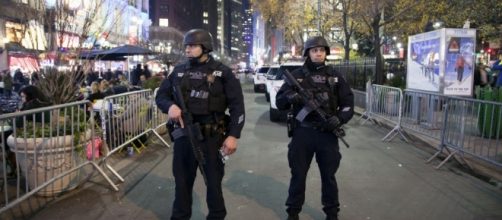Louisiana is enforcing the new "Blue Lives Matter" bill which gives officers protection, could consider resisting arrest as a hate crime, and this might spread nationwide.
In May 2016, Governor John Bel Edwards signed the first "Blue Lives Matter" bill, which protects active or retired police officers, firefighters, and EMS officials under the hate crime status that went into effect in August. St. Martinville Police Chief Calder Hebert enforces those laws and told KATC, a local ABC affiliate, that he hopes the new law makes offenders think twice about hurting a police officer.
"We don't need the general public being murdered for no reason and we don't need officers being murdered for no reason. We all need to just work together," Herbert said. "Resisting an officer or battery of a police officer was just that charge, simply. But now, Governor Edwards, in the legislation, made it a hate crime."
The 'Blue Lives Matter' law will not automatically charge resisting arrest as a hate crime
According to Herbert, his officers review new laws when they take effect, and each officer applies those laws according to his understanding and judgment in the field. It’s up to the prosecutor to authorize the charges.
First Assistant District Attorney Robert Chevalier, who spoken to Herbert about the new bill, claimed that the police arrest a suspect on the charges they feel are fitting for the situation, but the DA decides what charges the offender will face, based on the circumstances of the case and the law.
If the offender is found guilty of a hate crime by physically resisting an officer or assaulting an officer, then they will face more sentences on top of the original charges as stated in Louisiana’s law on hate crimes.
For example, if someone charged with a misdemeanor tries to resist an officer, then they’re accused of a hate crime. If found guilty, then the hate crime conviction will carry up to six months in jail, a $5 hundred fine, or both.
"We need the police and the public to work together. The policemen have a job. The public has the job of helping the police," Hebert said. “And if someone happens to be involved in criminal activity. Let the courts handle it. Don't resist physically. These guys go out there every day and the main goal is to protect the public and go home at the end of the day.
This is one step in making that happen. Hopefully, the rest of the nation follows suit.”
Herbert's dream may come true because Mississippi has adopted their version of the 'Blue Lives Matter' bill
On Jan. 24, the Judiciary, Division A Committee has passed Senate Bill 2469 to the Legislature. If Senate passes the bill, it will become law July 1. According to PoliceOne, a resource for law enforcement information, Committee Chairman Sean Tindell said that he thinks the bill is a “perfect avenue” to protect law enforcement.
During the meeting, the group excluded Sen. Chad McMahan’s amendment that would have limited the enhanced penalties to crimes committed against officers, so law enforcement would not abuse the new law.
The committee also rejected Sen. Barbara Blackmon’s alteration that would have made it a hate crime for a police officer who violates official protocol and kills someone. Blackmon argued that Mississippi needs more protection for black people from being targeted by police. "We want to give them, under color of law, enhanced protection, but when they do wrong, under color of law, we won't penalize them," Blackmon said.
Erik Fleming, chief lobbyist for the Mississippi chapter of the American Civil Liberties Union, wants to make sure verbal disputes with police are not subjected to the new penalties during protests. "It's unnecessary, but if it's going to pass, it should have First Amendment protections and it should be only for uniformed officers," Fleming said.
Just as Hebert stated, Tindell states that the DA decides if political protesters face hate crime charges.

